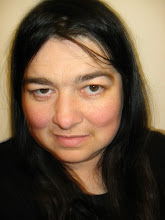When Ursula Le Guin wrote 'The Left Hand of Darkness', her intention was to illustrate the role gender plays in our society, by creating a world where gender divisions seemed irrelevant.
The people of Gethen had the ability to shift into the role of male or female and were usually asexual. When in 'kemmer' they became sexually active and adopted the role which best suited the circumstances. Thus the roles of powerful king and nurturing bearer of life was not necessarily mutually exclusive.
The story was told from the perspective of a man who visited their isolated world as an emissary representing the Ekumen, a federation spanning many worlds across the stars. It could be seen as an experiment in attitudes and theories, dealing with the socio-politics of gender.
The Wraeththu books by Storm Constantine appeared in the late 1980s, almost twenty years after Ursula Le Guin's award-winning book. At the time, youth culture was at its most ambivalent. Punk had given way to the New Romantic Movement and early Goth culture, which celebrated androgyny. Boys wore make-up and big hairdo's with relish. Remember Boy George and Sigue Sigue Sputnik?
Storm Constantine, herself an active participant in these sub-cultures, took its ideals a few steps further, by creating a post-Apocalyptic world where the strains of one hermaphrodite mutant spread quickly through mankind's youths, usurping the place of humanity as we know it. As sometimes happens in gay culture, though, gender roles reasserted themselves, even where the actual biology had become arbitrary.
The hermaphrodites of the Wraeththu cycle called themselves 'hara', (singular 'har'), but their race was called Wraeththu. Youths became 'hara' when infected with the blood of a Wraeththu, but adults subjected to the same treatment, died. The option was not open to females, although in book three, a female variant of the form, called 'Kamagrian', was introduced, probably in response to early feminist criticism of the books. The original Wraeththu trilogy comprised 'The Enchantments of Flesh and Spirits', 'The Bewitchments of Love and Hate' and 'The Fulfilments of Fate and Desire'. Although never best sellers, the books gained a cult following, which led the author to publish a new trilogy, the first of which appeared in 2003.
Storm Constantine manages her own small press, Immanion Press, which had, since its advent, published numerous Wraeththu books by fans and several new Wraeththu books from her own pen
The works of Ursula Le Guin and Storm Constantine had been labelled science fiction, but a slightly more recent publication by Jeffrey Eugenides which also features a hermaphrodite character, made it to the mainstream shelves.
Calliope Stephanides, the hero/heroine of Jeffrey Eugenides' 'Middlesex' inhabits the same world we do. He/she grew up in middle America, the offspring of immigrants, so deceptively normal seeming, so mainstream and yet, she hid a secret. In fact she was a secret, and the end result of a scandalous secret. When her grandparents came to America, they left behind the truth of their family relationship. As a direct result, Calliope, later Cal, is what we now refer to as an intersexual, a hermaphrodite. Unlike the people of Gethen, unlike the hara of Wraeththu, what Cal is, is problematic to our world vision and opens her up to a lifetime of prejudice and misunderstanding.
The theme of 'Middlesex' deals with, is ultimately choice and identity. Although raised a girl, Cal, who embarks on a journey of self-discovery through her family history, later chooses to emulate a more masculine role.
